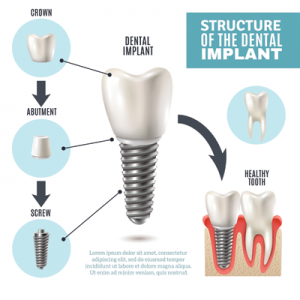Implants are a modern and reliable way to replace lost or badly damaged teeth. The implant looks and functions like a natural tooth.
Implants generally consist of a realistic replica tooth affixed to a metal post, though there are now some new emerging technologies that work with different materials.
The metal post is made of titanium which is implanted in the jawbone. Titanium is used because it bond to the bone at a molecular level (Osseointegration); this provided a very secure joint.
Till recently the outer replica tooth for implants was made of porcelain. This material looked very natural and was reasonably strong. But new implants are now using lithium disilicate or zirconia materials. Zirconia is significantly stronger than porcelain and its translucent qualities mean that it looks very realistic; this is used for replacing teeth at the front of the mouth. Lithium disilicate is an even stronger material, though it does not look quite as realistic in appearance; it is used for replacing the molars at the back of the mouth.
Some new technologies may bypass the metal post and make a tooth entirely out of lithium disilicate or Zirconia.
Dentist Implants Advantages:
- Unlike dentures the implants are permanent.
- Unlike bridges, the surrounding teeth do not need to be altered.
- Implants only require the same care, brushing, and flossing, that we should give to natural teeth.
- Complications from implants are quite uncommon
- Implants are very reliable, lasting for decades under normal conditions.
Looking for a Dentist in Carlingford?
Dental implants require two or three dental visits. But once affixed to the jaw they feel and function like natural teeth Patients can forget they even have implants. It is best to look after and keep our natural teeth. But dental implants provide a reliable alternative if we ever lose a tooth to damage or misadventure.
Information Disclaimer
The content of this article is meant for informational purposes only and should not be considered a source of professional advice, recommendations, or endorsements. It is not a substitute for seeking expert guidance or making well-informed decisions based on individual circumstances. Although we strive for accuracy and reliability, we cannot guarantee the information's completeness or suitability for all situations. Readers are urged to verify facts, consult experts, and consider their own context before taking actions or decisions based on this content. No warranties, explicit or implied, are provided regarding the accuracy, timeliness, or completeness of the presented information. Relying on this information is at the reader's own discretion and risk. We encourage readers to consult relevant professionals or experts for advice tailored to their specific needs. Neither the author, publisher, nor any affiliated parties will be held responsible for errors, omissions, or damages resulting from the use or reliance on the information in this article.

